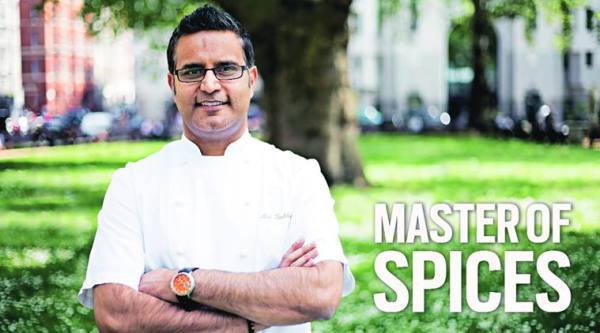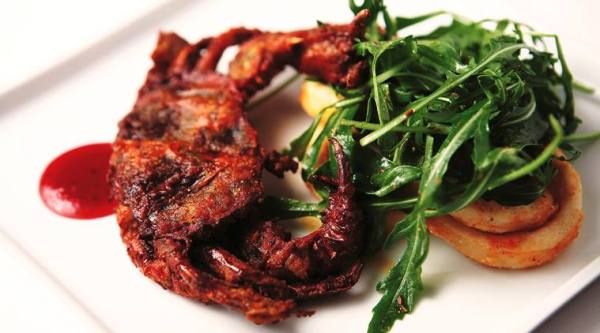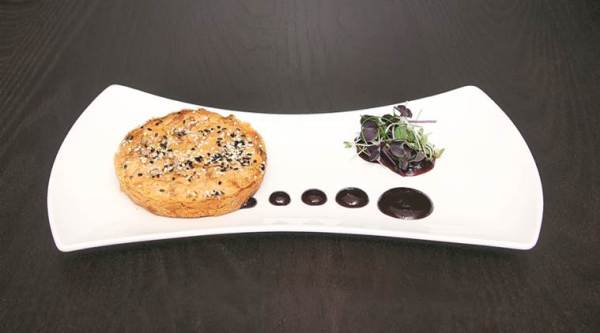Chef Atul Kochher’s food is all about being desi with a twist
Chef Atul Kochhar on winning a Michelin star for his two restaurants in London, and coming home to feed Mumbai a not-really-Indian meal.
 For chef Atul Kochhar, food is a family business.
For chef Atul Kochhar, food is a family business.
With a grandfather who was a baker and a father who ran a catering company, Atul Kochhar grew up surrounded by food and flavours in the family home in Jamshedpur. “From an early age, I learned how to pick fresh fruits and vegetables; it was a daily chore. So perhaps, it’s only natural that I ended up in hotel management,” says the Michelin-starred chef. He entered the Oberoi group and got his diploma in hotel management in Delhi. He had approached the course with an open mind but after a stint in the kitchen he decided to remain there. Even more than the actual task of cooking, Kochhar, 45, wanted to know more about the cultural heritage of cuisines from different parts of the world, and the migratory routes they take.
After graduating from the school in 1989, Kochhar spent two years completing the Oberoi management course across different brand properties in the country; it remains the premier finishing school for hoteliers in the country. “My first posting was as a junior sous chef in Bhubaneswar, where I remained for about seven-eight months. After that I returned to The Oberoi in New Delhi,” he says. He had missed cooking. “Not to take anything away from working in hotels, but as a senior chef in a big hotel, you essentially have a desk job. You get caught up with paperwork, requisition forms, ordering ingredients and so on and so forth. My time there was my turning point because I realised this was not what I wanted to do; I wanted to get my hands dirty and cook,” says Kochhar.
 Soft shell crab.
Soft shell crab.
But this was the early 1990s; the restaurant scene in India was yet to evolve to its current avatar. So Kochhar headed to London where the names of celebrity chefs such as Marco Pierre White, Charlie Trotter and the Roux brothers acted like a siren song. He worked briefly with White and a few other chefs before he was asked to head the kitchen at Tamarind in Mayfair. “The owner, Mrs Khanna, is a member of the royal family of Patiala. She wanted a restaurant that would reflect the ethos of north Indian food,” says Kochhar. He succeeded: Tamarind earned a Michelin star in 2001, and Kochhar became the first Indian chef to be awarded the coveted culinary distinction.
After being entrenched in north Indian sensibilities for so long, Kochhar felt the need for change. “I learned so much from Mrs Khanna but I wanted to push the boundaries of our myriad cuisines. India is a modern country, but our food is more than 3,000 years old. Our eating habits haven’t changed all that much in all this time. I’m not saying that’s a bad thing, but I wanted to pursue new paradigms,” says Kochhar. And so he did — in 2003, he opened his own restaurant, Benares (also in Mayfair). Named after the temple town but in no way mired in the past, the venture saw Kochhar draw on his childhood, tempered by his adult interests, to create a menu that appealed to both sensibilities, the modern as well as the traditional.
“I didn’t want to get bogged down by using only authentic ingredients from India and traditional cooking methods. I wanted to create Indian food using the ingredients locally available and using the best cooking method. If I wanted to do a rogan josh, using sous vide, then I would. But it has to taste the same as it would in Kashmir,” says Kochhar, who continues to keep spices as his golden standard, refusing to compromise on them.
 Scallops served at Benares.
Scallops served at Benares.
“For example, fish dishes from the country are usually curried because a lot of the fishes have strong flavours, but I wanted to explore other ways of cooking it. A meen moily is always curried, but what I’d do instead, is use a wild sea bass or a red snapper. You can’t curry those because the fish is too delicate. So, I would make a stock from the bones and cook it into a moily sauce. I’d bake or lightly fry it, tempering the oil with curry leaves and other spices that go into a traditional moily. And voila! the fish doesn’t disintegrate and retains the flavour of a moily, sans the curry,” he says.
Once again, fortune favoured his boldness and Benares, with signature dishes such as the heirloom tomato salad with 15 ingredients and a John Dory marinated in Indian herbs, was awarded the Michelin star in 2007, which it has consistently retained since then.
Meanwhile, the London that Kochhar migrated to in the early ’90s was rapidly changing. “Earlier, an Indian restaurant wouldn’t work unless it had a tandoor because non-Indians hadn’t realised that anything existed beyond curry cuisine. That’s changed now. Today, people walk in to a regional Indian restaurant, whether it is a Bengali or Gujarati one, and are excited to explore the food. They are well versed in the nuances of the cuisine,” he says. But not that much has changed for Kochhar. He continues to be “supremely guided” by the seasons and the local ingredients available. “Lamb has a season, essentially March and April, though you can stretch it to May. After that, it’s young mutton that’s available,” says Kochhar.
 Chicken Tikka Pie at NRI.
Chicken Tikka Pie at NRI.
And now after 22 years, he has returned home. Not that he didn’t visit now and then, but that was for personal reasons, he says. “I visit India several times a year but that’s to travel and explore the many regions of our country. I think that’s the reason I never thought of opening a restaurant here, because I came back to relax, not to work. My business partner and I debated the feasibility of opening a restaurant here many times and we always see-sawed between yes and no. Finally, we met the person who was to become our partner in India and he convinced us that it was time to return,” says Kochhar.
This week he is opening the doors to NRI (Not Really Indian) in the Bandra Kurla Complex in Mumbai. “The city has always fascinated me because it belongs to so many different cultures — not just the Marathis. That’s why we’re opening our first venture here, rather than Delhi, which I am so much more familiar with,” he says. This cross-cultural pollination is reflected in NRI’s menu, he adds. “Indians have always gone abroad and modified their cuisine to the places that they settled in. I thought it was time to bring some of that food home,” says Kochhar.
Outside the kitchen, Kochhar is a devoted father and an avid cricket fan. And who does he support when India plays England? “With all due respect to her Majesty and while I love England, which has been so incredibly warm to me, I remain an India fan,” says Kochhar.
The article was originally published under the headline ‘Master of Spices’.



- 01
- 02
- 03
- 04
- 05
























